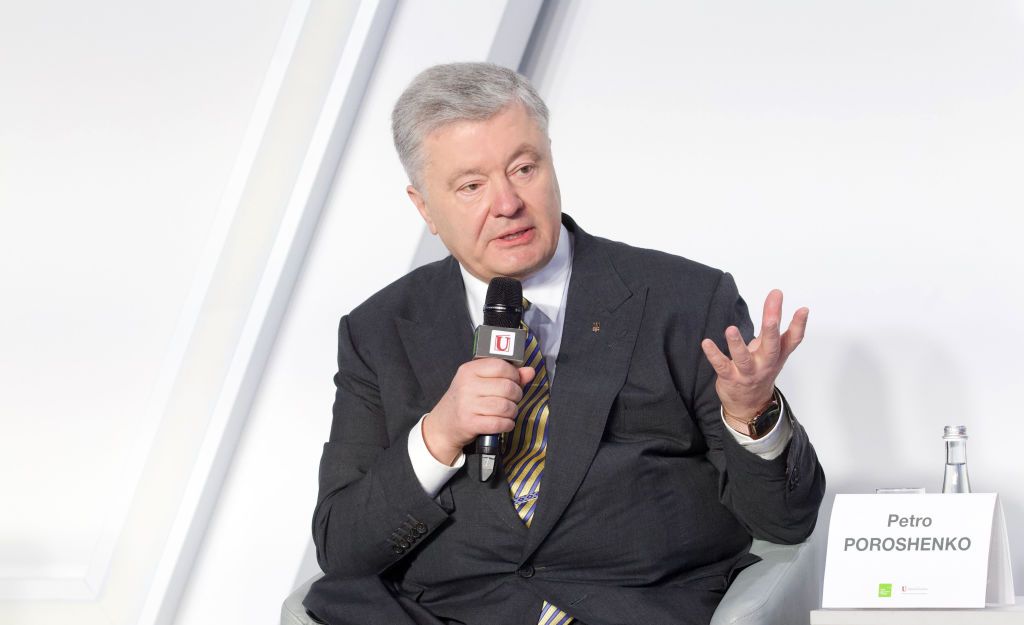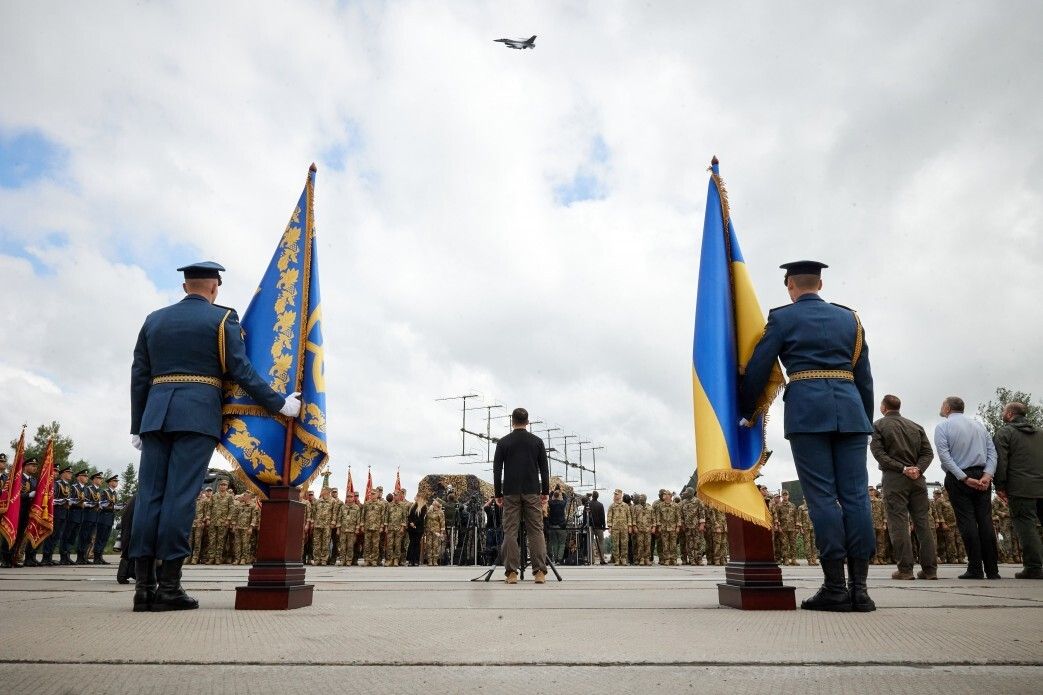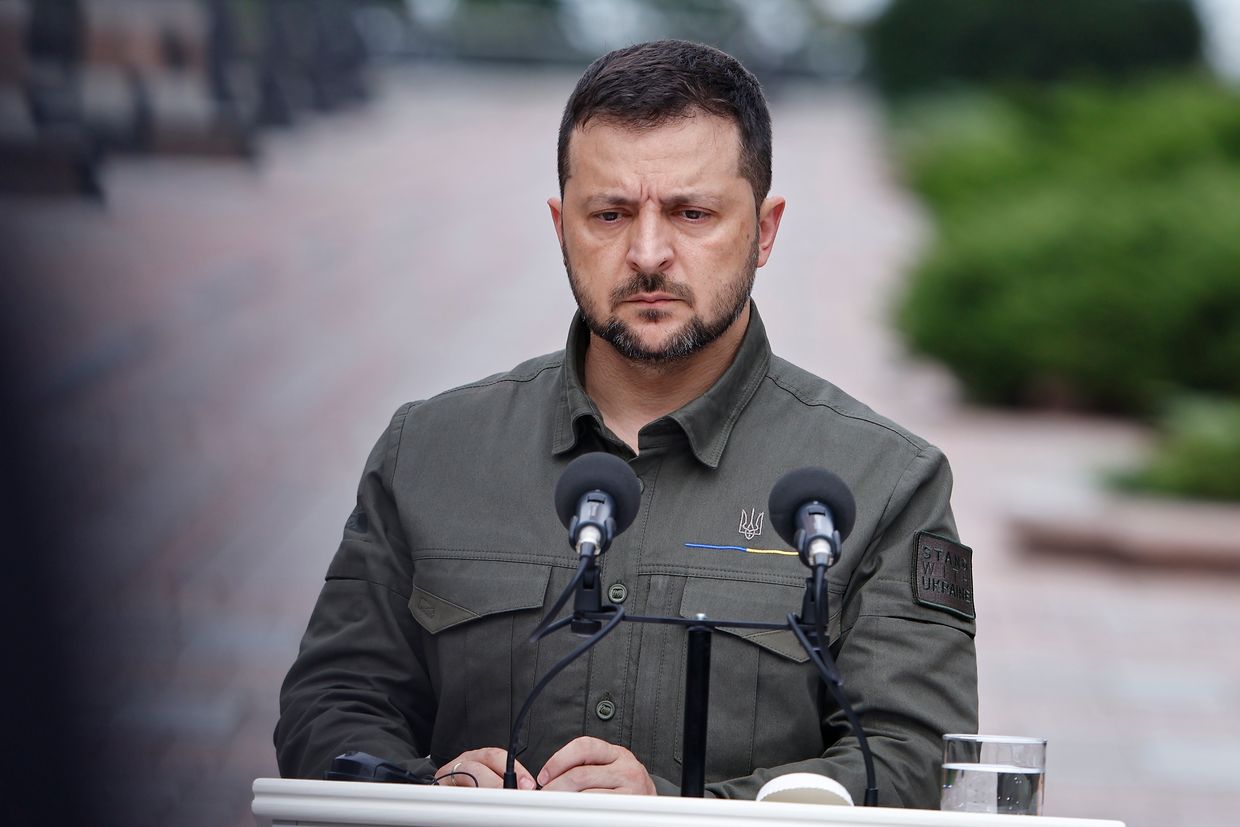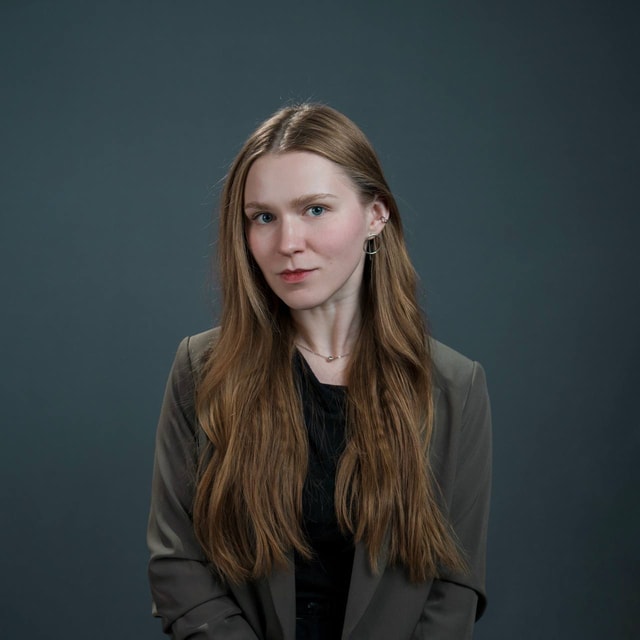Following an attack on opposition, Zelensky effectively begins election season
The U.S. pushes Ukraine to hold elections, Kyiv quietly prepares.

Ukrainian President Volodymyr Zelensky delivers a speech on the stand in front of the first General Dynamics F-16 Fighting Falcon received by Ukraine, congratulating the Ukrainian military on Aug. 4, 2024. (Ukrainian Presidency/Handout/Anadolu via Getty Images)
President Volodymyr Zelensky had imposed sanctions against the official leader of the opposition, ex-President Petro Poroshenko. The following decree was published on Feb. 13.
Despite the official reasoning given by the country's Security Service being high treason committed a decade ago, the unilateral sanctions imposed on the former president have been seen as a political rather than a security decision.
Following a growing political activity inside the country, and the official pressure from the U.S. on Kyiv to hold elections by the end of the year, experts say that the informal election season has begun in Ukraine.
President Volodymyr Zelensky said that Ukraine could hold elections being "in a strong position" after the "hot phase" of the war is over. He did not rule out that this could happen in 2025.
"(This) will be very difficult to do because society is against it. Because we want elections that we want to trust," the president said.
Lawmakers from the ruling and opposition parties who spoke to the Kyiv Independent played the blame game, saying it's the other side that is preparing for a vote. Meanwhile, both sides are.
"There is an electoral fever. The expectation of the end of the war has prompted the expectation of elections," said Volodymyr Fesenko, a Ukrainian political analyst.
Zelenskyʼs potential opponent
While on the campaign trail, Zelenksy promised to be a one-term president. That was before the all-out war catapulted Zelensky into worldwide stardom.
Zelensky's legitimacy is now questioned, however, by both Washington and Moscow alike.
Under martial law, presidential, parliamentary, and local elections are banned in Ukraine. If martial law had not been imposed, the next presidential election would have been held in the spring of 2024, and Zelensky's term would have ended on May 20.
Keith Kellogg, U.S. special Ukraine peace envoy, said on Feb. 1 that presidential and parliamentary elections in Ukraine "need to be done" possibly by the end of 2025.
"You're gonna reach a point where they're gonna have to have elections, and that's a sign of a healthy democracy," he said a few days later.
The sentiment echoes far-right commentators in the U.S. and the Kremlin who have been saying that no peace deal is possible with Zelensky since his term "expired."
When asked during recent interviews whether he is planning to run for another term, Zelensky did not rule out the possibility.
"It depends on how this war ends. Basically, it depends on people first and foremost, and of course on my family," he told American podcaster Lex Friedman.
Yet, if he decides to run, Zelensky might face a formidable opponent — Valerii Zaluzhnyi, Ukraine's former commander-in-chief, who was dismissed by the president following a public fallout.

According to a fall survey by the Social Monitoring Center, 27% of Ukrainians would vote for Zaluzhnyi, while only 16% would choose Zelensky.
"'Zaluzhnyi did not let the guys die,' is the thesis that Ukrainians use when talking about Zaluzhnyi," Oleksii Antypovych, Ukrainian sociologist and the head of the Rating Group, told the Kyiv Independent.
"This certainly creates an image of a hearty, kind defender, a father. And all this is supported, and people would be ready to vote for him," Antypovych added.
However, Zaluzhnyi, now an ambassador to the U.K., never officially stated his intention to run for office, despite hinting his interest.
If Zaluzhnyi doesn't throw his hat into the race, another figure is likely to take his spot.
Other personalities usually listed among those who can potentially run for president include spy chief Kyrylo Budanov and showman-turned-politician Serhii Prytula.
Old guard
While new faces are yet to emerge, there are signs that veteran politicians appear to have started groundwork in case elections are scheduled.
Former President Poroshenko, who now heads the opposition European Solidarity party, said in April 2024 that he was planning to participate in the next presidential election.
Despite Poroshenko's massive anti-rating and accumulated distrust among the majority of the population, the former president commands a small but dedicated support group. He also attempts to act presidential, sometimes working in parallel with the actual president.
When the Ukrainian delegation traveled to the U.S. in early December, Poroshenko also visited Washington at the time and shortly interacted with U.S. National Security Adviser Mike Waltz.
He sat for an interview with the Voice of America and proposed a "Poroshenko plan," mimicking Zelensky's "victory plan" presented in October 2024.
In early February, Poroshenko headed to the U.S. again, seeking to establish contacts with Trump's administration. He wasn't officially authorized to do so.
Publicly, Poroshenko denies that his party, which holds 27 seats out of 450 in Ukraine's parliament, is preparing for elections.
"Elections in Ukraine would undermine unity, "Poroshenko said.
"Who will win these elections? Poroshenko? Zelensky? I doubt it. One person will win them — Putin."
"I do not yet see the prerequisites for security conditions for holding (the elections)," Iryna Herashchenko, a lawmaker from the European Solidarity faction, told the Kyiv Independent.
"There are certain discussions at the committee level, but there hasn't been a serious conversation in the parliament."
Meanwhile, Poroshenko has been an ongoing target for law enforcement and the president's office.
Around 130 criminal cases were opened against Poroshenko, he said in late January, with most of them launched after appeals by people who are convicted or have fled to Russia.
Prior to Russia's full-scale invasion, Poroshenko was charged with high treason.
Telegram channels linked to the president's office have regularly hinted that Poroshenko would be prosecuted or sanctioned.

Zelensky approved a National Security and Defense Council (NSDC) decision on Feb. 13 to impose indefinite sanctions on several high-profile politicians, oligarchs, and businessmen.
Sanctions were imposed against oligarch Ihor Kolomoisky, billionaire Konstantin Zhevago, former PrivatBank co-owner Hennadiy Boholyubov, Viktor Medvedchuk, a former pro-Russian lawmaker accused of state treason, Poroshenko.
The sanctions freeze all assets held by the targeted individuals in Ukraine and block them from conducting financial transactions, among other restrictions. The decree states the measures are indefinite.
Poroshenko said that sanctions against him are "politically motivated."
"Why are they doing this? Hatred, fear and revenge. And because their election campaign has begun. Not for us. For the authorities," he said.
Kyiv Mayor Vitali Klitschko, one of Poroshenko's key allies, voiced support for the former president.

"When the fight against an external enemy is combined with a political struggle within the country, democracy and the country as a whole loses," Klitschko said.
Klitschko, who once led a nationwide political project and was seen as a potential presidential candidate, has had a long-standing conflict with Zelensky. He claims ongoing pressure from government authorities.
Professor Oleksiy Haran, research advisor at the Democratic Initiatives Foundation, connects the sanctions imposed on Poroshenko with the relaunched domestic political fights.
"I think now it's because these conversations about elections have started. Although Poroshenko is lagging behind Zelensky in the ratings," Haran said.
"It seems to me that this campaign, well, it will lead to a potential decline in Zelensky's popularity as well," he added.
"I honestly think that this is a bad step for the country as a whole. And that it will not add to Zelensky's authority."
Both Haran and Fesenko have been questioning the reasoning behind such a move.
"Poroshenko is not a competitor for Zelensky. He will be one of the prominent participants in the upcoming elections, but Poroshenko has no chance of winning over Zelensky," Fesenko said.
Another former heavyweight, ex-Prime Minister Yulia Tymoshenko, is leading the Batkivshchyna party and attempting to stay afloat.
Tymoshenko told the Economist, published in late September, that "the political process has definitely started."

Lawmaker Serhii Taruta, head of Industrial Union of Donbas and major backer of Batkivshchyna party, said that Zelensky's party had allegedly started getting ready for elections, scheduling the voting for May 2025.
"Then they (Servant of the People) considered the possibility that it would be in the fall. I suppose that all political forces, including Batkivshchyna, were not preparing but considering this possibility."
Tymoshenko was spotted in the U.S. during one of the events marking Trump's inauguration. It's unclear whether she was invited there and whether she met with American officials.
Zelensky, meanwhile, was represented by David Arakhamia, the leader of Zelensky's Servant of the People parliament faction, who headed the Ukrainian delegation at Ukraine-Russia talks at the beginning of the all-out war.
Arakhamia remains a vital link between Zelensky and his own party and an important player in any future political project connected with the president.
The pro-Russians
Election season in Ukraine is also a chance for Russia to disrupt the country's domestic political scene, something that was regularly done in the past.
In December, a TikTok video by Yuriy Boyko, a lawmaker and former head of the now-banned pro-Russian Opposition Platform — For Life party, sparked public outrage and speculation that Moscow is preparing for Ukrainian elections.
"(The existence of pro-Russian parties) in Ukraine today is simply impossible. This is a suicidal party that no one will vote for."
Following Russia's full-scale invasion, Boyko tried to brush off his pro-Russiannes. He condemned Moscow's war against Ukraine but continued spreading long-standing propaganda narratives.
"(The existence of pro-Russian parties) in Ukraine today is simply impossible. This is a suicidal party that no one will vote for," Antypovysh said.

In the meantime, he does not rule out that such parties can reinvent themselves and advocate for the protection of peace, Soviet and Russian culture, and the Russian language — a policy backed by Boyko and a number of other fringe Ukrainian politicians, such as Odesa Mayor Hennadiy Trukhanov.
Unlike with Poroshenko, the government isn't actively going after Boyko. Despite being embroiled in a number of high-profile corruption probes, Boyko was never charged.
Feseneko suggests that once martial law is lifted, Ukraine may amend its legislation and ban pro-Russian politicians from running for elections, although this move potentially could be appealed in court.
Future obstacles
Yet, elections remain a longshot, with Ukraine expected to face multiple challenges when it comes to making sure that such a vote is possible.
Russian constant attacks make it impossible to hold elections as hostilities are ongoing. Moscow's forces regularly launch missiles and drones at Ukraine, targeting population centers both in front-line settlements and those thousands of kilometers away.
Once martial law is lifted, Ukraine's Central Election Commission should announce the start of the election campaign. According to Ukraine's law, starting from that moment, 90 days should pass before presidential elections are to be held, 54 to 60 days before the parliamentary elections, and 50 days before local elections.
However, preparations for the post-war elections are expected to take even longer. Experts and lawmakers do not rule out the possibility that Ukrainian legislation may also be amended.

Over 7 million Ukrainians left the country as a result of Russia's war and are staying abroad. Another 4.5 million are internally displaced. That's around a third of Ukraine's entire population.
With around 20% of Ukraine's territories occupied by Russia, "millions more" remain in the Russian-occupied territories, according to Zelensky.
"And one of the most unfair things — how to vote without a million of soldiers," Zelensky said.
Another problem is the locations where a vote will be held. Electoral infrastructure, such as schools, is destroyed in multiple settlements in Ukraine-controlled territories due to Russian attacks.
"Now, it's not that these institutions don't exist; there are no cities, law enforcement agencies, judges, and the state is not actually represented there. This is one of the reasons for the lack of conditions for actually holding elections," Oleksandr Salizhenko, editor-in-chief of the political watchdog Chesno.












